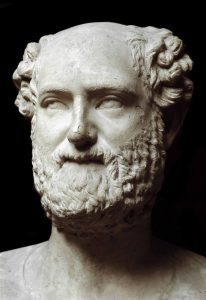From 7.00pm until 8.30pm
At ONLINE ONLY
£275
Greek and Roman Comedy
16 weeks - £275
Contact events@ginamay.co.uk for details of a discount for Open University Students
This course covers the comedies of Greece and Rome. The course begins by looking at Old Comedy in Ancient Greece through the works of Aristophanes before moving onto Middle Comedy with Menander. As well as considering the texts themselves, there will be an examination Greek Theatre and its place in society. We then move onto New Comedy looking at Roman comedy through the works of Plautus and Terence, but will also consider the satires of Juvenal in order to consider if and how they fit into this genre. As well as an assessment of texts, there will be an examination of Roman Theatre and its place in society. Students will consider the political and cultural influences on Greek and Roman comedy, their content, and the value of comedy as a source of political, cultural and historical evidence. The set books listed are the most economical and are all available second hand on Amazon, or from any other book retailer. The translations mentioned are not compulsory and any unabridged version, in paper or online format will be fine.
The course is delivered online in real time through our online classroom. Each class will last for one and a half hours. You will be provided with the necessary software to take part but will need a computer or tablet with a microphone and webcam. This course will require you to have installed the EZTalks Meeting client application found here: https://www.eztalks.com/download
Assessment is optional and is via an extended essay due four weeks after the end of the course. It is the mark from this essay that informs the overall classification of the course as either Pass, Merit or Distinction.
If you choose not to submit the essay, you will be awarded a certificate of completion.
The content of each week’s seminar is as follows:
Week 1 – An introduction to Old Comedy - Background and Backdrop
Week 2 – Aristophanes - the Tragedians and Mythic Novelty
Week 3 – Aristophanes and War - the Peace Plays
Week 4 – Aristophanes and Women - Feminist or Misogynist?
Week 5 – Aristophanes and the Philosophers - Right and Wrong Argument
Week 6 – Aristophanes’ Literary Technique - Genius or Plagiarist?
Week 7 – Reception Studies and Aristophanes - Beyond Old Comedy
Week 8 – Menander - New for Old
Week 9 – Menander - Comedy of Manners
Week 10 – From Old to New – Moving Forward whilst Looking Back
Week 11 – An introduction to Roman Comedy – Backdrop and Background
Week 12 – Plautus – Beginnings of the Musical and Relationship to Old Comedy
Week 13 – Stock characters. The ‘typical’ in Roman Comedy
Week 14 – Plautus and Terence – Love, Life and Misfortune
Week 15 – Menander, Plautus and Terence – The Funny Side of Rape
Week 16 – Horace and Juvenal – Ranting or Raving?
Set books:
Aristophanes, Lysistrata and Other Plays, trans. A. Sommerstien, (2003), Penguin, London
Aristophanes, Frogs and Other Plays, trans. D. Barrett, (2007), Penguin, London
Aristophanes, The Birds and Other Plays, trans. D. Barrett, (2007), Penguin, London
Horace, Complete Odes and Satires, trans. W.G. Shepherd, (2006), Penguin, London
Juvenal, Sixteen Satires, trans. P. Green, (1998), Penguin, London
Menander, Plays and Fragments, trans. N. Miller, (1987), Penguin, London
Plautus, The Pot of Gold and Other Plays, trans. E.F. Watling, (1964), Penguin, London
Plautus, The Rope and Other Plays, trans. E.F. Watling, (1964), Penguin, London
Terence, The Comedies, trans. B. Radice, (1976), Penguin, London
For more information and to book go to: www.ginamay.co.uk/tickets, email events@ginamay.co.uk, or call Gina on 07828199547
